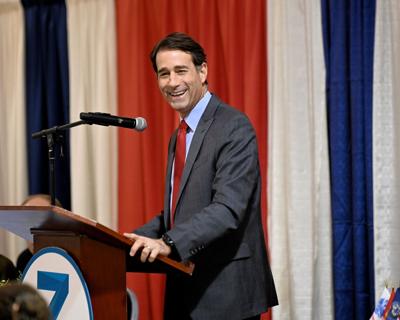WASHINGTON – U.S. Rep. Garret Graves asked the U.S. Department of Veterans Affairs to reverse a decision not to proceed with the Baton Rouge V.A. Outpatient Clinic expansion because of “unexpected” cost escalations.
Veterans Affairs had determined that the Baton Rouge clinic needed to find a place with more room because space at its current location off Essen Lane is limited.
“Years ago the Baton Rouge V.A. clinic was identified by the V.A. as one of the nation’s most urgently needed facility expansions,” said Graves, R-Baton Rouge. The department's choice to stop approving leases to achieve the larger clinic “is a betrayal of veterans’ trust.”
The clinic’s expansion was included in the Sergeant First Class Heath Robinson Honoring Our Promise to Address Comprehensive Toxics Act, or PACT Act, which was signed into law by President Joe Biden in August 2022. The PACT Act was a high-profile bill to increase funding for veterans who were exposed to hazardous substances during their military service and appropriated $797 billion to improve healthcare access.
Graves’ added language to the PACT Act that allowed for the V.A. to consider new lease proposals in Baton Rouge.
“Nearly two years later, the U.S. Department of Veterans Affairs has notified us that they will effectively not be proceeding with a new lease for the Baton Rouge Outpatient Clinic,” Graves wrote Wednesday to U.S. Veterans Affairs Secretary Denis McDonough. He asked for a meeting to discuss a "path forward" for what would have to be included in a new bid for leasing a larger Baton Rouge clinic.
Rep Garret Graves letter to U.S. Department of Veterans Affairs Secretary Denis R. McDonough
The department’s long-range construction budget in 2024 included a $29.5 million authorization for the Baton Rouge clinic. The money allowed for leasing a larger facility as opposed to building a new hospital, which could cost upwards of a billion dollars.
Graves said he repeatedly raised concerns about the restrictive site selection criteria, which he says limits cost savings.
Veterans Affairs informed Congress that 16 of the 31 leases approved exceeded the authorized levels by 60% to 150%. V.A. didn't want to extend the due date that would allow for more bids to be submitted. “Any further delay is unwarranted considering the number of viable proposals V.A. has already received,” the department reported.
Graves also blamed the Biden administration for the higher costs that limited the number of lease bids that could be accepted. Biden administration spending has caused inflation and raised the costs of the leases, Graves said. Those expensive programs that have added more money to the economy include an additional $1.5 trillion for the American Rescue Plan, $1.2 trillion for the Infrastructure Investment and Jobs Act, $739 billion for the Inflation Reduction Act, and $280 billion for the CHIPS and Science Act, Graves said.

